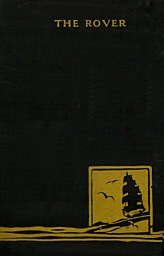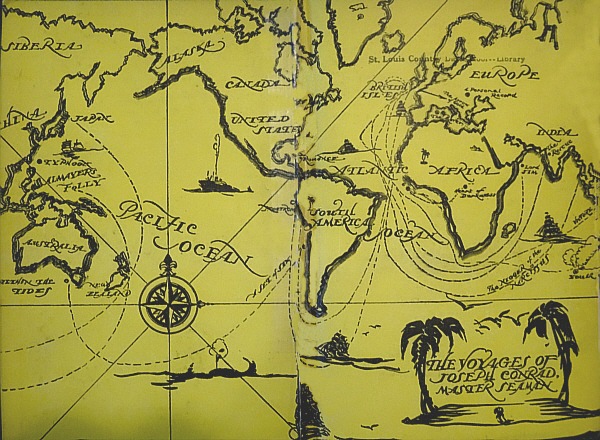In Oliver Sacks's book, A Leg to Stand On, he mentions on page 89 that his favorite
relative, a maiden aunt of 82 years old, visited him in the hospital when he was recovering
from a serious accident in which he lost complete control over his legs. It was her birthday
and Sacks gave her a book, The Maiden Aunt in Fact and Fiction. She loved it and said she
loved being a maiden aunt with 230 grand nieces and nephews. Then she reached in her bag
and pulled out a book for her favorite nephew Oliver saying, "And I've got a birthday-book
for you. You were away on your birthday, up in the Arctic. I know you love Conrad. Have
you read this?" Sacks said, "No, but I like the title."
[page 89, A Leg to Stand On ] "Yes," she said, "It suits you. You've
always been a rover. There are rovers, and there are settlers, but
you're definitely a rover. You seem to have one strange adventure after
another. I wonder if you will ever find your destination."
After reading that page I ordered a copy of The Rover, and to complete the symmetry, I read it while on an adventure down to Antarctica. We roved from Rio de Janeiro down through Uruguay, Buenos Aires, down to Ushuaia which is the end of world, the southmost point of any landmass on the Earth. Then we cruised into Palmer Station, a USA Experimental Station on the Antarctic Peninsula and returned to Buenos
Aires. It's the kind of long sea journey that marks so many of Joseph Conrad's stories.
Inside the front cover of this hardback book is a wonderful diagram which illustrates
where Conrad's various novels are set in the world. It is a rough world map covering the
book's paste down and free endpapers. A dotted line draws the long voyages between India
and England for Lord Jim, between South America and Australia in A Set of Six, along the
Congo River in The Heart of Darkness, e.g., and for The Rover, the title simply fills the
Mediterranean Sea. Even though he was mostly ashore during this novel, he spent a lot of
time looking out on the sea from the hills near his residence outside of Toulon, France.
Conrad gives away the ending of the novel on the dedication page:
To
G. Jean Aubry
In Friendship
This Tale of the Last Days of a
French Brother of the Coast
Now that we know all about it, we can proceed to read it with interest. Our hero is
Master-Gunner Peyrol who lets down his anchor for the final time near the Toulon
harbor on the coast of France. Peyrol gives us a description of the dock area, and,
already on page 2, Conrad bombards us with recondite words of Peyrol's time which
was during the aftermath of the French Revolution. Although the revolution happened
while he was at sea, he had to justify his dislike for the over turned royalty.
[page 2] Peyrol took a survey of the quay. Groups were forming
along its whole stretch to gaze at the new arrival. Peyrol noted
particularly a good many men in red caps and said to himself: "Here
they are." Amongst the crews of ships that had brought the tricolour
into the seas of the East, there were hundreds professing sans-culotte
principles; boastful and declamatory beggars he had thought them.
But now he was beholding the shore breed. Those who made the
Revolution safe. The real thing.
Not familiar with the term sans-culottes, which seems to indicate people not
wearing pants, I looked it up, and what I found wasn't very helpful. Typically that's the
case with an idiomatic expression in a foreign language. Then it hit me that culottes
must mean "fancy pants" and that would make sans-culottes a perfect term for the
common people who could not afford bread, much less fancy pants. The revolutionaries
apparently adopted the term sans-culottes for themselves to indicate their disdain for
those who did wear fancy pants — the loyal royals who deserved their turn under the
guillotine.
The post-captain in charge of admitting arrivals to France in the harbor attacks
Peyrol, apparently as a way of acquiring his credentials.
[page 4] "You must have been a deserter from the Navy at one time,
whatever you may call yourself now."
Peyrol is nonplussed and turns the tables on the shabbily dressed post-captain.
[page 4] "If there was anything of the sort it was in the time of kings
and aristocrats," he said steadily. . . . I knocked about the Eastern
Seas for forty-five years — that's true. But let me observe that it was
seamen who stayed at home that let the English into the Port of
Toulon." He paused a moment and then added: "When one thinks of
that, citoyen Commandant, any little slips I and fellows of my kind
may have made five thousand leagues from here and twenty years
ago cannot have much importance in these times of equality and
fraternity."
The post-captain resumes his vague attack on the Gunner Peyrol, knowing that he is
a custom official with the ability to chop the head off anyone he doesn't like or anyone
he believes is lying to him. It is the landlubbers versus the brothers of the coast and the
post-captain controls the domain of the land, and he wants Peyrol to know it. What
ensues is a volley of wits and Peyrol refuses to take a defensive posture — he merely
states the facts.
[page 4] "As to fraternity," remarked the post-captain in the shabby
coat, "the only one you are familiar with is the Brotherhood of the
Coast, I should say."
"Everybody in the Indian Ocean except milksops and
youngsters had to be," said the untroubled Citizen Peyrol. "And we
practised republican principles long before a republic was thought
of; for the Brothers of the Coast were all equal and elected their own
chiefs."
"There were an abominable lot of lawless ruffians,"
remarked the officer venomously, leaning back in his chair. "You
will not dare to deny that."
Citizen Peyrol refused to take up a defensive attitude. He
merely mentioned in a neutral tone that he had delivered this trust to
the Port Office all right, and as to his character he had a certificate
of civism from his section.
Peyrol was a patriot and entitled to his discharge, which he duly received, and he
ignored the whispers of the pencil-pushers (quill-drivers) as he walked to the door. He
hires a farmer to haul him to the coast, giving the excuse of a grievous wound for his
awkward entry into the cart. When he recognizes an area where he lived as a youth some
fifty years earlier, he gets out the cart near an inn and asks a woman who resembled his
mother for a man to help him move his luggage into the inn. She provides him a laborer
to move his baggage. But Peyrol stands at the gate until the carters left with their cart
filled with empty wine-casks. After he had eaten his supper in silence, he obtains a
candle and walks slowly up the staircase which creaked as if he were carrying a heavy
load.
[page 11, 12] The first thing he did was to close the shutters most
carefully as though he had been afraid of a breath of night air. Next,
he bolted the door of the room. Then sitting on the floor, with the
candlestick before him between his widely straddled legs, he began
to undress, flinging off his coat and dragging his shirt over his head.
The secret of his heavy movements was disclosed then in the fact that
he had been wearing next his bare skin — like a pious penitent his
hair-shirt — a sort of waistcoat made of two thickness of sail-cloth
and stitched all over in the manner of a quilt with tarred twine.
Peyrol was carrying about 65,000 francs in coins of various foreign currencies, and
he wanted a safe place to dig a hole to bury out of sight the loot he had laboriously
carried from the locker of the ship. It consisted of gold coins, Dutch ducats, Spanish
pieces, and English guineas, and he was careful no one knew about his treasure. He
knew no customs-guard would dare to attempt to search a prize-master headed to the
port offices to make his report. It worked and now he needed a place to stay and found
one at a nearby farm. While waiting for the master of the Escampobar Farm to arrive
and give him permission to stay, Peyrol knew he was ready. He thought, "I have seen
everything", and thus was ready to face anything without showing a sign of surprise.
[page 25] By the time he had heard of a Revolution in France and of
certain Immortal Principles causing the death of many people, from
the mouths of seamen and travelers and year-old gazettes coming out
of Europe, he was ready to appreciate contemporary history in his
own particular way. Mutiny and throwing officers overboard. He
had seen that twice and he was on a different side each time. As to
this upset, he took no side. It was too far — too big — also not
distinct enough. But he acquired revolutionary jargon quickly
enough and used it on occasion, with secret contempt. What he had
gone through, from a spell of crazy love for a yellow girl to the
experience of treachery from a bosom friend and shipmate (both
those things Peyrol confessed to himself he could never hope to
understand), with all the graduations of varied experience of men an
passions between, had put a drop of universal scorn, a wonderful
sedative, into the strange mixture which might have been called the
soul of the returned Peyrol.
We have seen the secret treasure and gotten a view into the soul of Peyrol, so
different from the innocent lad of eleven who first went to sea as a stowaway on a ship.
As for the things he professed he could never hope to understand, rightly understood,
only karma can explain some things which can only be balanced by working out over
multiple lifetimes.
Joseph Conrad writes strong prose and delicate prose equally well. Take this
example; "The sky rested lightly on the distant and vaporous outline of the hills; and the
immobility of all things seemed poised in the air like a gay mirage." (Page 31) He has
shown us the rover's soul of Peyrol, and now undergoes to explain how this soul has
come to find its rest here along the remote shoreline of Toulon.
[page 31] Whatever enchantment Peyrol had known in his
wanderings it had never been so remote from all thoughts of strife
and death, so full of smiling security, making all his past appear to
him like a chain of lurid days and sultry nights. He thought he would
never want to get away from it, as though he had obscurely felt that
his old rover's soul had been always rooted there. Yes, this was the
place for him; not because expediency dictated, but simply because
his instinct of rest had found its home at last.
Even though his soul had found rest, Peyrol became concerned about the curious
movements of the English ship. A shot fired one night seemed to be a signal to someone
on shore. Peyrol began to look out of his second-floor windows at the night sky and particularly at the sea, and he began to form a plan. He had already salvaged a tartane, a
small fishing boat, which he kept ready for sea transport if he needed it, and a friend
Michel to go with him.
[page 100] Often waking up at night he would get up to look at the
starry sky out of all his three windows in succession, and think:
"Now there is nothing in the world to prevent me from getting out to
sea in less than an hour." As a matter of fact it was possible for two
men to manage the tartane. Thus Peyrol's thought was comfortingly
true in every way, for he loved to feel himself free, and Michel of the
lagoon, after the death of his depressed dog, had no tie on earth. It
was a fine thought which somehow made it quite easy for Peyrol to
go back to his four-poster bed and resume his slumbers.
A plan begins to unfold in Peyrol and the French Lieutenant Real's minds: a way to
get a dispatch into the British hands which will deceive Admiral Nelson into a false
move which would be costly to his fleet.
[page 143] This scheme of false dispatches was but a detail in a plan
for a great, a destructive victory. Just a detail, but not a trifle all the
same. Nothing connected with the deception of an admiral could be
called trifling. And such an admiral too. It was, as Peyrol felt
vaguely, a scheme that only a confounded landsman would invent. It
behooved the sailors, however, to make a workable thing of it.
The main problem was to get the false dispatch into Admiral Nelson's hands
without arousing suspicions that it was intended for him or else its effect will be nil.
Peyrol knew the deception could not be maneuvered by mere words, but rather by deeds.
[page 143] The old rover had enough genius in him to have arrived
at a general conclusion that if they were to be deceived at all it could
not be done very well by words but rather by deeds; not by mere
wriggling, but by deep craft conceal under some sort of straight-forward action.
It soon becomes clear that the rover Peyrol is headed back to sea in his little tartane
as part of that deed which will steer the Admiral into harm's way. In a beautiful
metaphor Peyrol comments on the seaworthy nature of his fishing boat.
[page 254] The tartane, obeying the helm, fell off before the wind,
with her head to the eastward.
Peyrol murmured: "She has not forgotten how to walk the
seas." His subdued heart, heavy for so many days, had a moment of
buoyance — the illusion of immense freedom.
Was Peyrol going to freedom on the seas or to freedom from the bounds of earth and
sea? Clearly, he was no longer to be a landsman, stuck on a spit of land overlooking the
sea, but on the sea, in battle again, if only through a battle of wits with a worthy
opponent, the great British Admiral Nelson. We have walked the land with Peyrol from his cottage
down to the sea and back up. We have stood beside him as he observed the surreptitious
movements of the British corvette from his upstairs windows. We have listened to his
thoughts as he planned carefully what to do, and how carrying out this plan would affect
the rest of his life. In the end it was the feeling of freedom, of walking the seas again, that shaped his actions and the rest of his life.
~^~
Any questions about this review, Contact: Bobby Matherne
~~~~~~~~~~~~~~~~~~~~~~~~~~~~~~~~~~~~~~~~~~~~~~~~~~~~~~~~~~

 == == == == == == == == == == == == == == == ==
== == == == == == == == == == == == == == == ==
22+ Million Good Readers have Liked Us
22,454,155
as of November 7, 2019
Mo-to-Date Daily Ave 5,528
Readers
For Monthly DIGESTWORLD Email Reminder:
Subscribe! You'll Like Us, Too!
== == == == == == == == == == == == == == == ==
Click Left Photo for List of All ARJ2 Reviews Click Right Bookcover for Next Review in List
Did you Enjoy this Webpage?
Subscribe to the Good Mountain Press Digest: Click Here!


CLICK ON FLAGS TO OPEN OUR FIRST-AID KIT.
All the tools you need for a simple Speed Trace IN ONE PLACE. Do you feel like you're swimming against a strong current in your life? Are you fearful? Are you seeing red? Very angry? Anxious? Feel down or upset by everyday occurrences? Plagued by chronic discomforts like migraine headaches? Have seasickness on cruises? Have butterflies when you get up to speak? Learn to use this simple 21st Century memory technique. Remove these unwanted physical body states, and even more, without surgery, drugs, or psychotherapy, and best of all: without charge to you.
Simply CLICK AND OPEN the
FIRST-AID KIT.

Counselor? Visit the Counselor's Corner for Suggestions on Incorporating Doyletics in Your Work.

All material on this webpage Copyright 2019 by Bobby Matherne
![Click to return to ARJ Page, File Photo of Joseph Conrad, Credit: George Charles Beresford [Public domain], via Wikimedia Commons](http://www.doyletics.com/arj/theroaut.jpg)





